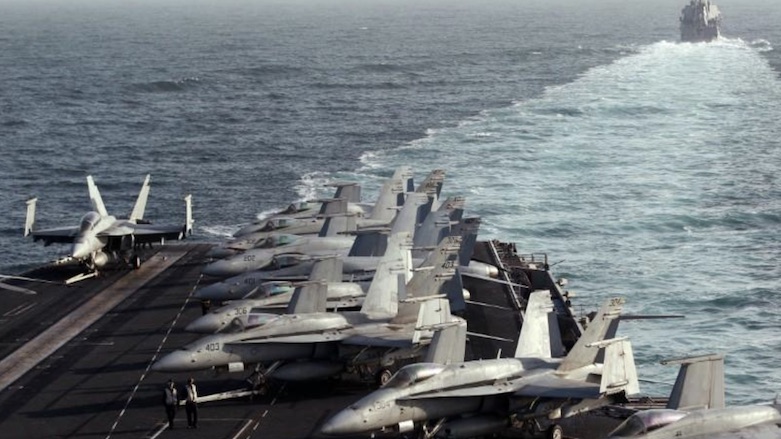US dismisses Iranian threats to Strait of Hormuz as ‘rhetoric’

WASHINGTON DC (Kurdistan 24) – “Rhetoric” is how US Secretary of Defense James Mattis characterized Iranian threats to block shipping in the Strait of Hormuz—through which over one-third of the world’s seaborne oil exports pass.
On Monday, Gen. Alireza Tangsiri, commander of the navy of Iran’s Islamic Revolutionary Guard Corps, affirmed that Iran controlled the Persian Gulf and the Strait of Hormuz and that the US Navy should leave.
“We can ensure the security of the Persian Gulf and there is no need for the presence of aliens like the US and the countries whose home is not here,” the Iranian press quoted Tangsiri as saying.
Mattis, asked about that statement, while chatting informally with reporters on Tuesday shortly before a Pentagon press briefing, dismissed it as “rhetoric.”
Chairman of the Joint Chiefs of Staff, Gen. Joseph Dunford, when asked about the statement during the press conference itself, responded, “For decades our forces have been postured in the Gulf to ensure freedom of navigation, and we’ll continue to do that.”
The senior Pentagon officials appeared completely unfazed by the Iranian threat.
In response to another question, Mattis added, “Iran has been put on notice that the continued mischief they’ve caused around the area” will not be tolerated by the US.
Mattis listed what he considered to be Iran’s unacceptable activities: its support for the Syrian regime; its threats against the Strait of Hormuz; its support to Yemen’s Houthis, who “fire missiles into Saudi Arabia;” and the “Iranian—supplied UAVs that are being flown against international airports.”
In late July, the Houthis claim to have used a drone to attack the Abu Dhabi airport. Officials in the United Arab Emirates (Abu Dhabi is one of seven emirates that constitute the UAE) denied the Houthi claim, although airport authorities acknowledged that an incident involving a supply vehicle had occurred.
Mattis’ statement would appear to corroborate the Houthi claim, although the drone appeared to have caused no significant damage.
Brian Hook, newly appointed as the State Department’s Special Representative for Iran, addressed the Foundation for Defense of Democracies on Thursday and spoke similarly about the regime in Tehran.
Hook detailed the sanctions that the US has already put on Iran—and will impose soon, the most hard-hitting of them involve Iranian oil exports, which the US aims to bring to zero, or as close as possible, starting November 4.
Hook listed the ways in which the Iranian regime now spends its resources, even as the Iranian people suffer economic hardship.
“Thanks to Iranian subsidies,” Hook said, “the average Lebanese Hizbollah fighter earns two to three times per month more than what a fireman in Tehran brings home.”
Iran spends $700 million per year on Lebanese Hizbollah, while it has spent “at least $16 billion in supporting its proxies in Syria, Iraq, and Yemen,” he stated.
“Iran has historically provided over $100 mil/year to Palestinian groups, including Hamas and Palestinian Islamic Jihad,” while “Iran has extended at least $4.6 billion in lines of credit to Syria.”
Hook also revealed that in response to the terrorist conspiracy last month, in which an Iranian diplomat, based in Vienna, provided explosives for a plot to bomb an Iranian opposition rally in Paris, the French government has announced its own measure against Tehran.
“We are heartened by the news this morning that our great ally France is indefinitely postponing all nonessential diplomatic travel to Iran because of Iran’s role in this plot,” he said.
